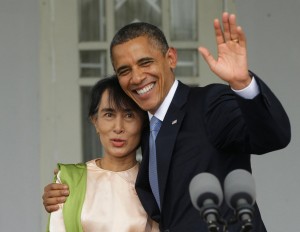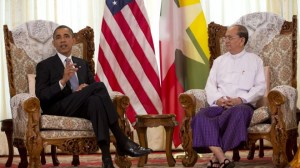Yesterday Barack Obama became the first president of the United States to visit Myanmar (otherwise known as Burma). But it was hardly a cause for universal celebration.
Specifically, international human rights groups criticized him for conferring legitimacy on this country’s oppressive regime. Not least because it is perpetrating the kind of ethnic cleansing of minorities (most notably, the Rohingya Muslims) that provoked the United States to bomb Bosnia in 1995 to stop Serbs from ethnically cleansing Muslims.
More significantly, these international groups were merely voicing the long-suffering concerns of local political dissidents. For here is how human rights activist Myra Dahgapaw, who fled the ethnic cleansing in Burma’s northern Karen State, threw cold water on this historic occasion even before Obama landed:
This trip will bring little or no benefit to the people of Burma but just further legitimize the Burmese regime’s power.
(Washington Free Beacon, November 16, 2012)
 No doubt, but for the invitation of the universally celebrated Nobel Peace Prize laureate, Aung San Suu Kyi, Obama would not have visited Myanmar. Indeed, the White House went out of its way to stress that, but for Cambodia hosting two regional summits, Obama would not have become the first president of the United States to visit that country today because of its human rights abuses.
No doubt, but for the invitation of the universally celebrated Nobel Peace Prize laureate, Aung San Suu Kyi, Obama would not have visited Myanmar. Indeed, the White House went out of its way to stress that, but for Cambodia hosting two regional summits, Obama would not have become the first president of the United States to visit that country today because of its human rights abuses.
Never mind the double standard inherent in Obama having no such qualms in 2009 about visiting China – a country whose human rights abuses make Myanmar’s seem tame by comparison.
Whatever the case, the irony is not lost on me that just two years ago Suu Kyi would’ve been admonishing him against visiting for the same reasons Dahgapaw did last week. More to the point, it’s arguable that the only meaningful step President Thein Sein has taken towards democracy was to release Suu Kyi in 2010 from nearly 15 years of house arrest.
But he has since co-opted this former “democracy icon” into his political establishment – as leader of the loyal (i.e., powerless) opposition in parliament. Nothing demonstrates the extent to which he has co-opted Suu Kyi quite like her deafening silence while majority Buddhists continue their ethnic cleansing of minority Muslims. This, even in the face of the UN designating Myanmar’s Muslims “the world’s most persecuted people.”
Yet, whenever challenged to explain her silence, the Buddhist Suu Kyi demurs, saying self-righteously that she is not taking sides to preserve her impartiality as repairer of the breach. But just imagine how much worse the religious cleansing of minority Muslims by majority Hindus in India would have been if the Hindu Gandhi had not been so vocal in condemning it.
But I warned that her (personal and political) liberation would do little to facilitate democratic reform in Myanmar:
To read some accounts, you’d think long-imprisoned pro-democracy leader Aung San Suu Kyi being elected to parliament in Myanmar is every bit as significant as Nelson Mandela being elected president in South Africa…
[But] despite Suu Kyi’s celebrated participation, yesterday’s parliamentary elections are no more a harbinger of democratic change in Myanmar than quinquennial elections are in Cuba.
(“Myanmar: One Small Step for Democracy; One Giant Leap for Aung San Suu Kyi,” The iPINIONS Journal, April 2, 2012)
 What’s more, Thein Sein has shrewdly used Suu Kyi to curry favor with Western leaders/donors for whom the international celebrity she now enjoys is a political aphrodisiac. Obama, duly seduced, brought along $170 million in financial aid.
What’s more, Thein Sein has shrewdly used Suu Kyi to curry favor with Western leaders/donors for whom the international celebrity she now enjoys is a political aphrodisiac. Obama, duly seduced, brought along $170 million in financial aid.
Nonetheless, he rationalized his visit by claiming that it is not an endorsement of the government of Myanmar but an acknowledgement of the democratic path the country is now on (which will come as news to the hundreds of political dissidents still withering away in prison).
Ironically, his rationalization for awarding Myanmar his presidential imprimatur smacks of that which the Nobel committee proffered for awarding him the Nobel Peace Prize in 2009; namely, not for brokering any peace, but for the potential he had for doing so. The oppressed people of the world, especially the Rohingyas and Palestinians, are still waiting for him to realize his Nobel potential.
Having joined Dahgapaw in throwing cold water on it, I shall now part company by asserting that I do not think this trip was too soon. In fact, Obama should have visited Burma for the same principled reason he should be the first president of the United States to visit purportedly rogue nations like Iran, Cuba, Venezuela and North Korea.
For if President Ronald Reagan could visit the Soviet Union during the Cold War, there is no politically (or morally) consistent reason President Barack Obama should be loath to visit any country on earth.
Related commentaries:
Small step for Burma, giant leap for Suu Kyi